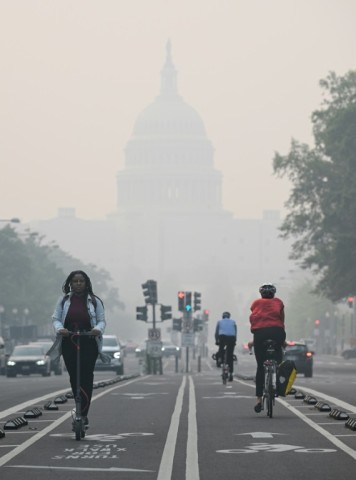
NEW YORK - Smoke from Canadian wildfires shrouded US cities in a noxious haze again Thursday, delaying flights and disrupting outdoor events in what President Joe Biden called a "stark reminder" of climate change.
Thick skies and an acrid campfire smell hung over the capital Washington, with the Environmental Protection Agency rating parts of the mid-Atlantic region at "Code Maroon," the highest category of the Air Quality Index, signaling hazardous conditions.
This exceeded some of the most polluted cities in the world in South Asia and China, leading many residents to wear masks to protect their health. The situation is not forecast to improve until the weekend.
"This morning, millions of Americans are experiencing the effects of smoke resulting from devastating wildfires burning in Canada, another stark reminder of the impacts of climate change," Biden said in a statement.
He added he was sending extra resources to Canada, including "additional firefighters and fire suppression assets such as air tankers," on top of 600 American personnel sent in May.
The White House postponed an outdoor Pride event, although a parade and festival this weekend remain on course now. The National Zoo meanwhile announced it would close "for the safety of our animals, our staff and our guests."
The Washington Nationals, the capital's Major League Baseball team, announced it was postponing its afternoon game against the Arizona Diamondbacks.
Hemadri Vora, a 42-year-old tourist from Mumbai, was spending the day with her family in Washington after a visit to New York.
"It's a little disappointing," she told AFP at the Washington Monument, but added she was used to similar pollution levels back home. "Obviously, the pictures are not going to be very clear."

Public schools in the capital canceled all outdoor activities including recess, physical education, athletic practices and competitions.
The Federal Aviation Administration meanwhile said low visibility had forced it to take steps to "manage the flow of traffic safely into New York City, DC, Philadelphia and Charlotte."
Environmental groups were also quick to draw attention to climate change, which is creating warmer, drier conditions that are increasing the risk and extent of wildfires.
"This is the climate crisis, here and now, causing dangerous air pollution and threatening the health of millions of people," said May Boeve, Chief Executive of 350.org.
'Reminded me of 9/11'

Skies were noticeably clearer in New York compared to Wednesday, even as the air quality index remained high.
Officials handed out face coverings at train stations, bus depots and parks, and declared public schools would switch to remote-learning on Friday.
Linda Juliano, a 65-year-old secretary, gladly accepted one at Grand Central Station in Midtown Manhattan.
"I've never seen anything like it," she told AFP, describing the sepia-tinged smog that engulfed New York on Wednesday as "scary."
"It reminded me a lot of 9/11, seeing the sky all smoky and everything," said Juliano, who said she kept the windows closed and the air conditioner on at her home in Huntington, Long Island.
Meanwhile in Canada, pollution from the wildfires is expected to peak Thursday in Toronto, Environment Canada said.
With nearly 800,000 hectares (two million acres) affected, according to the Society for the Protection of Forests Against Fire (SOPFEU), Quebec is experiencing a historic fire season.
Twice as many blazes have been recorded this year compared to the average over the past ten years.
On Thursday, the French-speaking province still had more than 150 active fires, including nearly 90 out of control.

New reinforcements -- from the United States, France and Portugal -- are expected in the hours and days to come. More than 12,000 people have been evacuated within the space of a few days.
The situation remains worrisome in several regions, explained Stephane Caron, of SOPFEU.
"We are only at the very beginning of this fire season. We are now entering the period when usually there are beginning to be larger fires in Quebec," he said.
The risk of a new outbreak is rated "extreme" by authorities in the western part of Quebec.
These blazes are of high intensity and spread rapidly, and are therefore very complex for firefighters to stop, officials say.

